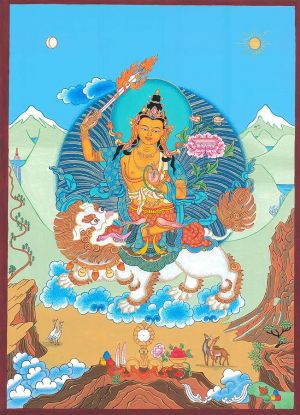Difference between revisions of "What is lojong in Tibetan Buddhism?"
Jump to navigation
Jump to search
(Created page with "thumb ===Lojong literally means ‘Mind Training’=== These are practices that are are aimed at changing our natural instinctive reactions so tha...") |
|||
| Line 1: | Line 1: | ||
| − | [[File: | + | [[File:2546gh24113 n.jpg|thumb]] |
| Line 10: | Line 10: | ||
These are practices that are are aimed at changing our natural instinctive reactions so that they can be diverted towards [[compassion]] and are steeped in a more helpful basis. | These are practices that are are aimed at changing our natural instinctive reactions so that they can be diverted towards [[compassion]] and are steeped in a more helpful basis. | ||
| − | These teachings, emphasise the practice of [[bodhichitta]] or [[compassion]] and especially [[relative bodhichitta]] and at times also deal in [[Wikipedia:Absolute (philosophy)|ultimate]] [[bodhichitta]] or [[emptiness]]. | + | These teachings, emphasise the practice of [[bodhichitta]] or [[compassion]] and especially [[relative bodhichitta]] and at times also deal in [[Wikipedia:Absolute ([[philosophy]])|ultimate]] [[bodhichitta]] or [[emptiness]]. |
| − | The important [[Lojong]] teachings include the ‘Seven Point [[Cause]] & Effect’ and and the 'Equalising & Exchanging Oneself for Others'. | + | The important [[Lojong]] teachings include the [[‘Seven Point [[Cause]] & Effect’]] and and the [['Equalising & Exchanging Oneself for Others']]. |
They were introduced to [[Tibet]] by [[Lord Atisha]] in the eleventh century. | They were introduced to [[Tibet]] by [[Lord Atisha]] in the eleventh century. | ||
Latest revision as of 08:34, 21 January 2022
Lojong literally means ‘Mind Training’
These are practices that are are aimed at changing our natural instinctive reactions so that they can be diverted towards compassion and are steeped in a more helpful basis.
These teachings, emphasise the practice of bodhichitta or compassion and especially relative bodhichitta and at times also deal in [[Wikipedia:Absolute (philosophy)|ultimate]] bodhichitta or emptiness.
The important Lojong teachings include the [[‘Seven Point Cause & Effect’]] and and the 'Equalising & Exchanging Oneself for Others'.
They were introduced to Tibet by Lord Atisha in the eleventh century.
Source
[[1]]
